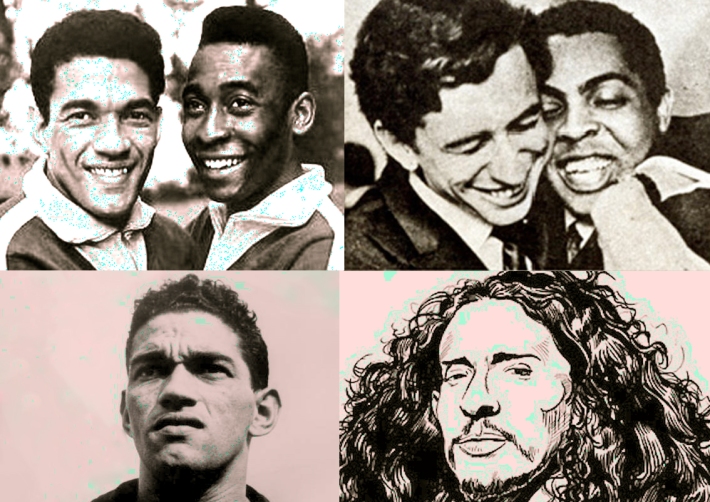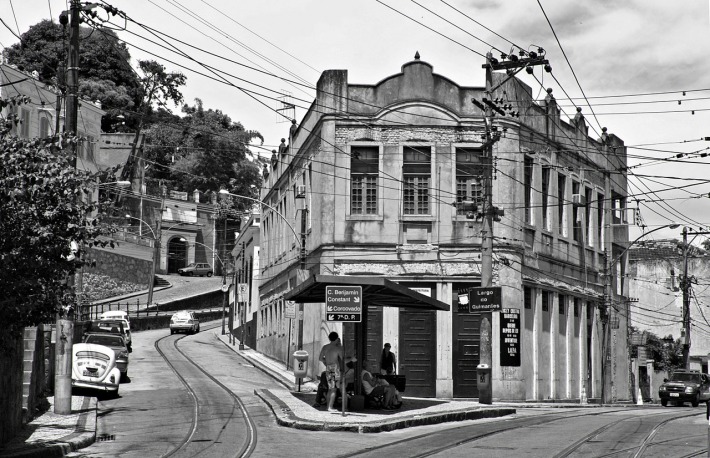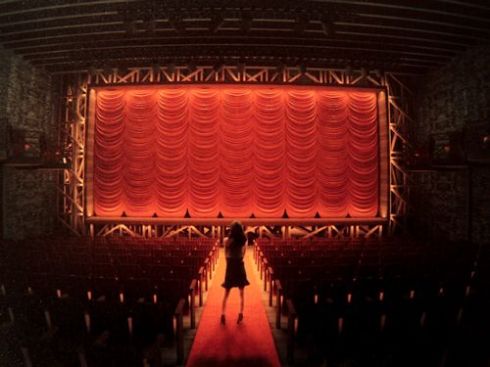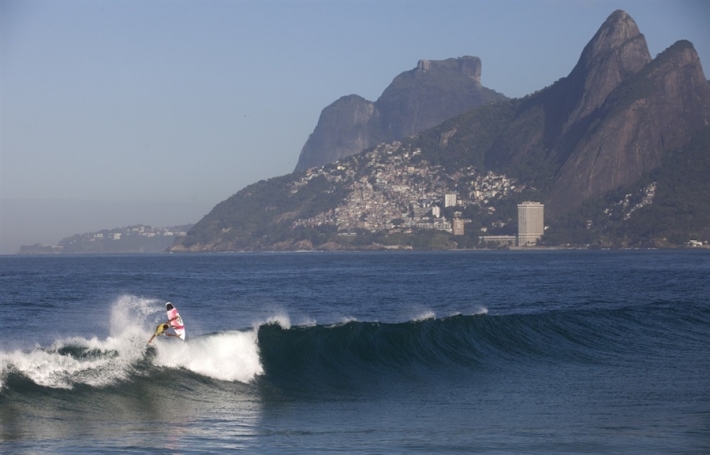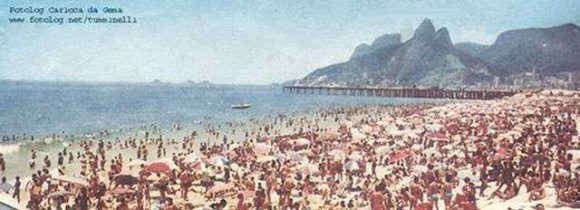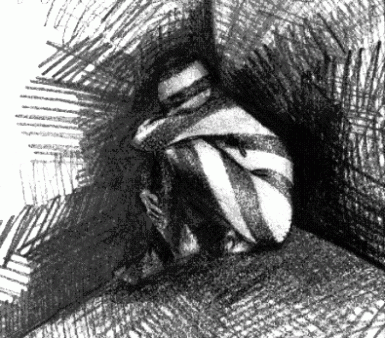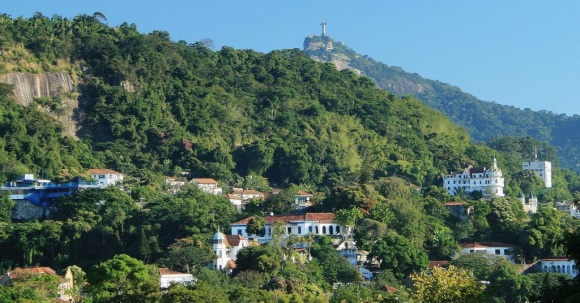
After a year, the hotel became a mixture of home, club and circus; we enjoyed that neighborhood as if we were in a village and only left Santa Teresa for work or for special occasions. Whenever we could. and the weather permitting, we’d hang around appreciating the view, chatting and making music. Meanwhile, as in any human gathering, groups began to form and, perhaps because of our financial limitations, Rosa and I stayed stuck with the bohemian one but continued to have good relations with everyone else. On meal times, all factions came together and greeted each other in the lobby, where the old folk played cards, the divorcees showed off their latest girlfriends and Rico, a pianist/actor played tunes on the hotel’s old piano.
These were the mid-eighties, and cocaine consumption was rampant. When Luis Melodia’s producer, Sergio, came to live in one of the better rooms the partying became heavier. The girls who served us in the dining room lived in the Morro dos Prazeres favela so the supply of the white stuff was never a problem. It didn’t take long for our noses to be constantly running while we locked ourselves together in each other’s rooms, talking like crazy before going out to town to party. Rosa and I were the youngest of the group and it was great to hang out with our new well-connected and more experienced friends. Because I was very skinny and somewhat green, there were many attempts to snatch her from me, but as far as I know, no one ever succeeded.
A few months down the line, a heavy surfer type called Kadu moved in and it did not take long for him to join the gang. He had split up with his girlfriend and for some reason he shared his room with his mum and his young son. He was two years older than me, 27, and his brother was a proper drug dealer who constantly went to New York on “business”. As we had similar backgrounds; both of us were exiles from Ipanema. Soon we became mates and the friendship was blessed by his mum, an upper class lady who felt comfortable to tell me how horrified she was with the level of the people in that hotel. With him, my consumption became serious and as money started to become an issue, strange ideas about buying and selling the white powder began to cross my mind.
Meanwhile, at college a colleague came up with a “business” deal he was trying to set up with an American who wanted to buy a large quantity of blow to take back to the U.S. In my naivety, I thought this was a good opportunity to make some extra cash and asked around in the Hotel if anyone had a contact who could get me 250 grammes of cocaine, a respectable amount. Petit, a famous illustrator from Sao Paulo whose leg had also been affected by polio, lived with his straight girlfriend in one of the good rooms. He was one of the most popular characters in the hotels who despite his handy cap was always in a good mood and drunk. He put me in contact with Gamba, a toothless black guy from the Sao Carlos favela with Mike Tyson’s build but taller. We met in the car park one night; I gave him a thousand hundred US dollars and he said he’d be back with the stuff in two days.
The goods took much longer to arrive than he had promise and my friend at university and I began to get nervous. We put pressure on Petit but he did not know where nor how to find, Gamba. When the stuff finally arrived, we got a precision scale to weigh it and there was only about half of what we had ordered, one hundred and fifty grammes. We made a desperate attempt to find him, but that night there was a raid and the streets around the hotel were alive with police cars and with officers stopping everyone who dared to pass by. We did mage to circulate, knocked on a few doors but as soon as we mentioned the name Gamba, they turned away or closed their doors in fear.
There was no other option other than mixing the stuff with something else. The next day we bought vitamin C pills and boric acid and added them to the content. As we sat there like junky scientists doing our thing, it was hard to convince the rest of the guys not to dive into the pure stuff and I almost got into a fight with Kadu to make sure this didn’t happen. Anyway, we refrained from consuming our merchandise and managed to get the mixture convincing and ready. In the end because the coke wasn’t as good as our customer expected we had to give the American a huge discount and barely broke even. Our plans to commemorate our debut as dealers were reduced to finishing up the small portion we had kept for ourselves.
*
Signs from heaven began to appear saying that we were doing the wrong thing.
The first one was a car accident. I was about to graduate in Economics at the UFRJ and to do so I needed to complete obligatory the university’s Physical Education program. I had left this problem in the back burner because of my heavy life style that involved living at the Hotel Santa Teresa tenant, being an English teacher, a college student and guitarist in a rock and roll band all at the same time. As the graduation date approached this issue became serious because if I did not get the credits, I simply would not graduate. A chance came up; they organized a hike to the Pico da Tijuca, the highest point in the Tijuca forest and whoever went on it would get the grade and pass. This was just what I needed, but there was a problem: Getting there. The closest bus stop was a one-hour walk away and without a car I would have no means of meeting the group at the assembly point at the beginning of the trail which was located deep in the forest.
Maria do Carmo, a quiet journalist and psychologist who lived in the hotel was volunteered to lend me her beetle for that morning. I was very grateful for her being kind enough to save my academic life despite not knowing me very well. Not only on from the academic point of view was the outing good news; this was going to be an amazing trek through Rio’s dense forest on a sunny day, a healthy break from all that craziness. I arrived there in her blue beetle at seven-thirty am and by ten we were already had already reached the peak. The air was clear, the sky was cloudless, the weather was perfect and the view was magnificent and up there everyone was ecstatic for seeing Rio de Janeiro in all its glory. We all came back in a great mood and I was looking forward for lunch and an afternoon by the hotel’s pool.
Santa Teresa a half an hour drive away through the forest. After signing the teacher’s roll call, as soon as I got back into the car I took out a joint and put Bob Marley on the cassette player and drove through the narrow roads. As I was about to arrive at the place where tourists go up to the Christ Statue, I went round a curve while a coach was coming in the opposite direction. It was an awkward moment because the road was very narrow and I had to squeeze between the tour bus on my left and the rock wall on my right. While we were crossing each other, it felt like driving in a narrow corridor. At that moment, a car overtook the bus and we had a frontal collision. Although both of us must have been going at twenty kilometers an hour, the crash was strong enough for me to break the front glass with my forehead, and made a significant dent on Maria do Carmo’s car’s bonnet.
I got out of the car fuming and trying to think what I would tell when I got back to the hotel. I was OK, no bones damaged, but the site of the car in that state made everything go red, so I went up to the driver preparing to beat the hell out of him but could not believe when I saw that he was a friend of mine.
“Rique, it’s you?! Sorry man!”
“What a prick! It could only be you! What the fuck was passing through your head man?!”
He could only admit his fault and apologize. On the positive side he agreed immediately to pay for all the expenses.
Then there was the case of the borrowed bass guitar. Out of the blue Heitor, our drummer, called me up to say that Charles, our manager and mentor, wanted to hook us up with a great singer. The sixteen-year-old vocalist happened to be Tim Maia’s nephew, Tim Maia being the godfather of Brazilian Soul and Funk a tropical mixture of Barry White, by competence and looks, and James Brown, by attitude.
As our Bass player, Duda, was travelling it fell on me to replace him. I had to ask around for a borrowed bass and managed to borrow one from my English course colleague, Erwin. It was a fake Brazilian made Rickenbaker but with a heavy and jazzy sound. I took it to the hotel, showed it off and trained with it a bit until my fingers got used to the thicker strings and I was ready for the rehearsal.
Tim Maia’s nephew, Ed Motta, would grow to become a big name in Brazilian music, also singing funk and soul, classier but less charismatic than his uncle. For us in the Charle’s studio in the Morro de Sao Carlos favela, he was just an overweight but massively talented teenager looking for a band. The rehearsal went really well with us playing known songs, some of our funks which he improvised over and simply jamming. However, we never heard of him again. it must be said that Duba, our guitarist, was great at solos but not as great with rhythms, in particular funk, that was my specialty, so perhaps the band may have been too heavy for him.
When I got back to the hotel, I put the bass in the room and found Rosa playing cards with some old ladies at the reception. We were late for a concert I had got free tickets for at the Circo Voador, Rio’s coolest venue in neighboring Lapa. She excused herself and we left for Barao Vermelho’s concert which was great. The house was packed, the energy was perfect and the band was inspired which allowed for a fantastic Brazilian Rock night.
When we got back to the hotel the room door was open and Erwin’s bass was missing. We searched like crazy, a friend from the hotel drove me up and down Santa Teresa to see if we caught anyone walking around with a bass guitar case, but neither helped. The next morning, we asked the hotel manager to search in people’s rooms but he refused, which annoyed me but there was nothing I could do. We asked around but nobody seemed to know about my colleague’s instrument. The end result was that I was forced to buy him a new bass and that I began to mistrust people in the Hotel.
.
next
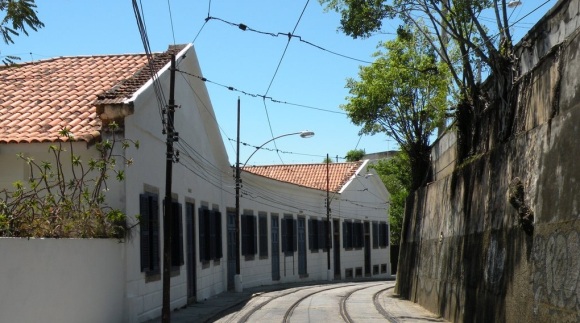
Posted in
short stories and tagged
book on Brazil,
books on Brazil,
Brazil,
brazilian culture,
brazilian history,
brazilian politics,
Crime in Rio,
Hotel Santa Teresa,
Rio,
Rio de Janeiro,
Santa Teresa,
Tijuca Forest |
